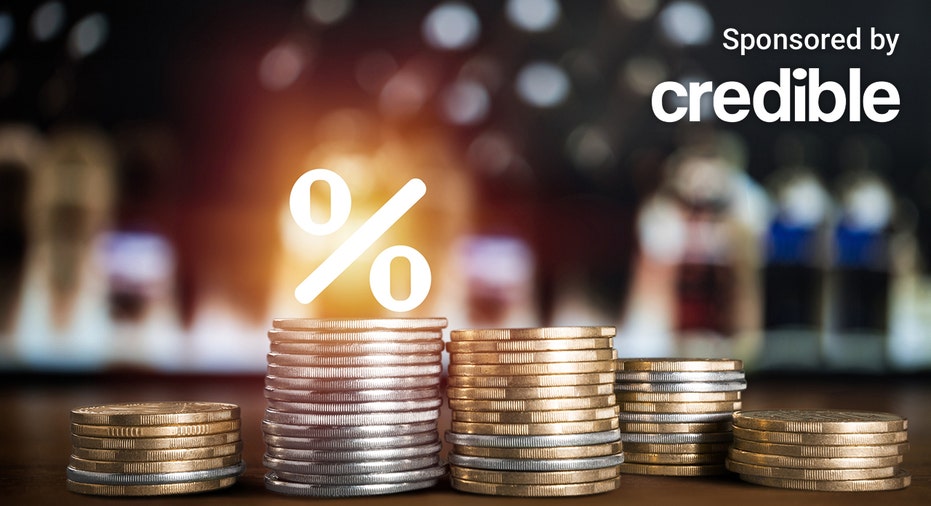Here's what the Fed's rate hike means for your wallet
Consumers can take advantage of low rates now before they rise further

The Federal Reserve raised interest rates for the first time since 2018 at its March meeting. Here's what that means for consumers. (iStock)
Last week, the Federal Reserve raised the federal funds rate for the first time since 2018, increasing it by 25 basis points. This quarter-point hike brought its target range to 0.25% to 0.5%, and consumers will soon begin to feel its effects.
The federal funds rate affects the rate at which banks lend money to each other. When the Federal Open Market Committee (FOMC) raises rates, it forces banks to raise their overnight lending rates. These higher borrowing costs are then passed on to the consumer in the form of higher interest rates on credit cards, mortgages, student loans, personal loans, auto loans and many others.
For some loans, such as personal or private student loans that have a fixed interest rate for the length of the loan, this change will only affect those who take out a new loan or want to refinance. But for other loan types, borrowers could begin to see changes right away, including increases in their monthly payments.
The Federal Reserve currently predicts it will raise rates several more times this year and into 2023. If you're looking to reduce your monthly expenses before interest rates rise even further, consider refinancing your private student loans. Visit Credible to find your personalized rate today.
FEDERAL RESERVE RAISES INTEREST RATES: WHAT TO DO NOW
How will mortgages be affected by the Fed rate hike?
For many mortgage types, such as the 30-year fixed-rate mortgage or 15-year mortgage, monthly payments will remain unchanged. In fact, only new borrowers or homeowners looking to refinance will be affected by higher interest rates.
However, other mortgage holders such as those with an adjustable-rate mortgage (ARM) could see their payments increase. For example, a five-year ARM will have a fixed interest rate for five years. After that, the rate will fluctuate with the average rate in the market. If rates move higher, so will a homeowner’s monthly payment.
If you want to lock in your mortgage rate ahead of future increases by the Fed, you could consider refinancing your home loan. Visit Credible to compare multiple mortgage lenders at once and choose the one with the best interest rate for you.
Credit cards could charge higher rates
Credit card users could see interest increase on their cards. Most credit cards have a variable annual percentage rate (APR), which changes based on the direction of interest rates. Consumers are given an interest rate such as "prime plus 15%," meaning their rate will be whatever the prime rate is at the time, plus an additional 15%.
But even credit card users that don’t have a variable APR could still see their rate increase. Credit card companies can raise rates on users who have had their card for at least 12 months, but they must provide at least 45 days of written notice.
If you want to compare your credit card options and ensure you have the best card for you, visit Credible to compare cards without affecting your credit score.
INFLATION RISES TO YET ANOTHER NEW 40-YEAR HIGH IN FEBRUARY
Fed raises rates to fight rising inflation levels
The Federal Reserve announced that it is raising rates to combat rising inflation, which is currently at a 40-year high of 7.9% annually. Fed officials explained that several more rate hikes will likely be warranted in order to calm inflation as it trends higher.
In a post-meeting statement, the FOMC cited COVID-19 pandemic-related "supply and demand imbalances" as a cause for inflation, in addition to "higher energy prices, and broader price pressures."
Although inflation is likely to remain strong for the remainder of 2022, the central bank’s shift in its monetary policy could begin to slowly reduce inflation. Despite higher interest rates, this could be good news for consumers’ wallets as they look for relief among other daily expenses.
If you're looking for a way to pay down high-interest debt or reduce your monthly expenses, you could consider taking out a personal loan at a lower interest rate. Contact Credible to speak to a loan expert and get all of your questions answered.
Have a finance-related question, but don't know who to ask? Email The Credible Money Expert at moneyexpert@credible.com and your question might be answered by Credible in our Money Expert column.




















